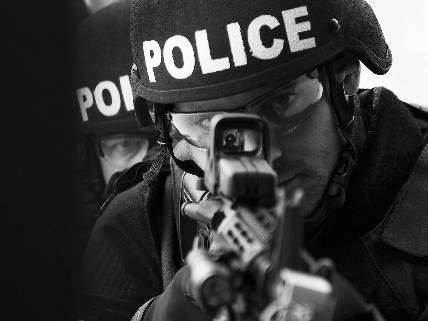Data on Shootings by Police is Even Worse Than We Thought
As noted often here at Reason, there is no national database compiling data on shootings by police. Nothing that matches the overall number of shootings against the ones deemed "justified." Nothing that allows trends to be studied based on crime rates, officer training, local gun laws, or any other relevant metric. Nothing at all. Which is why sports websites and a few journalists and academics have volunteered to pick up the slack.
The FBI issues a "Uniform Crime Report," but does not require individual police agencies to supply them with info on police shootings, even justifiable homicides, so most agencies simply keep that info to themselves. According to the Salt Lake Tribune, police agencies in Utah reported 18 justifiable homicides by law enforcement from 2007-2012, contrasting with the Tribune's review identifying 59 homicides over that same six-year span.

On a national scale, the Wall Street Journal studied data from more than 100 of the country's largest police agencies and found the internal data added up to "about 45% more than the FBI's tally for justifiable homicides in those departments' jurisdictions" and also noted that "nearly all police killings are deemed by the departments or other authorities to be justifiable."
The Tribune cites one federal effort to create an "Arrest-Related Deaths" report, by the U.S. Bureau of Justice Statistics (BJS), "but when an audit found too many deaths missing in the BJS national data, the program was discontinued. No data after 2009 will be available." Translation: the government tried to find out how often its agents were killing its citizens, failed in its mission, and promptly gave up.
It remains difficult to fathom how a federal government which studies the effects of video game violence every few years and employs a National Security Agency (NSA) operating on a "collect all the data" mantra would be unable to compel local police agencies, a great many of which receive gratis military equipment from the feds, into supplying basic data on the most sensitive incidents a police officer can be involved with, the shooting of a citizen.
Brian Buchner of the National Association for Civilian Oversight of Law Enforcement explained to the Tribune why transparency is in the interests of law enforcement:
"The absence of data makes it difficult for individual agencies, the policing profession and others to really understand what these incidents are, what agencies are more likely to have shootings, what factors influence shootings or the lethality of shootings, who is involved — so you can reduce them," Buchner said. "They're negative outcomes. Even righteous, justified shootings have a negative impact — to the person who was shot, to the officer, to the communities. You want to reduce the shootings that occur. It's hard to do that without understanding them."
Just as importantly, easily accessible data on shootings by police would allow the media and the general public to examine the particulars behind each shooting, rather than just treating them as raw numbers to be judged on their frequency.
A shooting involving a criminal initiating violence with a police officer should be treated differently than a shooting involving an unarmed man unwittingly startling a rookie cop in a housing project stairwell. But until we have access to the numbers, the bare minimum of data required to assess necessity and frequency of such incidents, a mutual mistrust will continue to exist.


Show Comments (72)